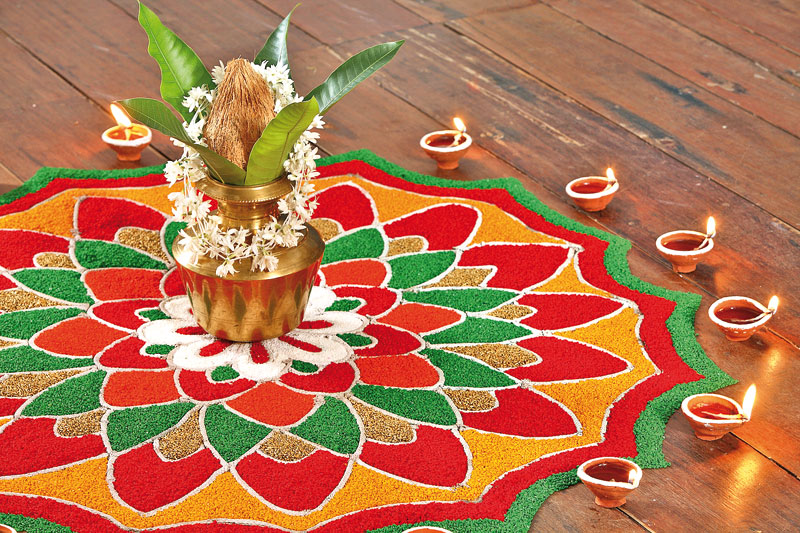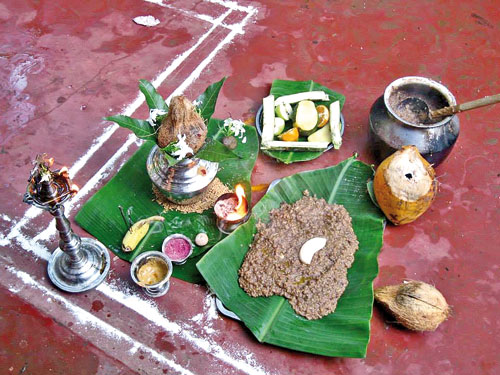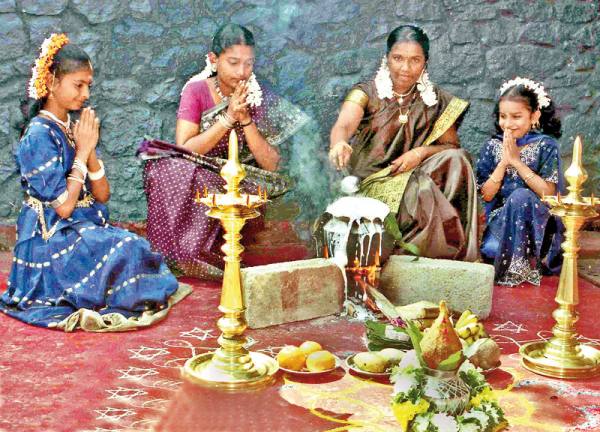 Thai Pongal, the agrarian festival of the Tamils, will be in full flow around the country today. It is a festival celebrated not only in Sri Lanka and India, but all over the globe where Tamil populations are concentrated. It is essentially a festival of thanksgiving by farmers after their first harvest of paddy, but has become an ingrained aspect of the wider Tamil culture now. Most cultural Tamils in Sri Lanka, whether they be Hindus or Christians celebrate Thai Pongal, as it is viewed as a cultural festival, not a religious one.
Thai Pongal, the agrarian festival of the Tamils, will be in full flow around the country today. It is a festival celebrated not only in Sri Lanka and India, but all over the globe where Tamil populations are concentrated. It is essentially a festival of thanksgiving by farmers after their first harvest of paddy, but has become an ingrained aspect of the wider Tamil culture now. Most cultural Tamils in Sri Lanka, whether they be Hindus or Christians celebrate Thai Pongal, as it is viewed as a cultural festival, not a religious one.
Nevertheless, having its roots in early pagan nature worship of our forefathers, the festival (as it is practised mainstream) incorporates several aspects of nature worship. To the farmer whose main festival this essentially is, it must be remembered that nature in her manifold avatars serve to either make or break him. The sun’s heat is needed – but it shouldn’t be too hot nor too prolonged. The rain’s soothing downpours are needed – but at the right time in the right amounts. Too much would lead to floods and too little to drought. Both would wreak havoc on the crops – as the average Sri Lankan farmer very well knows.
Asian communities
Also acknowledged are the fertilizers and nutrients, even the weeds, and last but not least, the animals working on the farm – all their contributions are duly recognized on Thai Pongal Day. Rice is the staple diet of many Asian communities. To this day, fluctuations in paddy harvests or rice prices can cause turmoil. Imagine the time whence this festival originated millennia ago – where communities depended on their own crop productions to sustain themselves, without benefit of the global economy to see them through their shortfalls – and the reason for the immense amount of gratitude exhibited in this festival becomes clear.
A bountiful harvest of paddy would ensure the sustenance of the community through the rest of the year. To the farmer who toils under sun and rain, both aspects of nature instead of being considered hardships, have assumed godlike properties. Thus the deification of Surya the Sun God and Indra the Rain God. The contributions of the cattle working on the farm is gratefully felt and acknowledged too. Indeed, even their manure is gratefully acknowledged; it serves as valuable fertilizer to the crops. So that too has become deified as a result. A clump of manure with a tuft of bermuda grass on top is said to depict Lord Ganesh and are often seen at Pongal sites.
 The term ‘bulls***’ therefore does not translate into its intended connotation for the average farmer, as it does to the rest of the population. This aspect of early nature worship which has since become incorporated into Hinduism is sometimes mocked by others as (for lack of a better term), ‘bulls***’. Yet to this day, the farmer, especially if he or she is an organic farmer spurning chemical fertilizers, has no problem lauding the manure and giving it a place worthy of worship in sustaining their livelihoods – which in turn ensures the sustenance of the wider community too.
The term ‘bulls***’ therefore does not translate into its intended connotation for the average farmer, as it does to the rest of the population. This aspect of early nature worship which has since become incorporated into Hinduism is sometimes mocked by others as (for lack of a better term), ‘bulls***’. Yet to this day, the farmer, especially if he or she is an organic farmer spurning chemical fertilizers, has no problem lauding the manure and giving it a place worthy of worship in sustaining their livelihoods – which in turn ensures the sustenance of the wider community too.
New pot of pongal
Why manure attained an exalted place in the Thai Pongal festival therefore is not too hard to understand. What is difficult to understand however is the place given to Bermuda grass? Known as ‘Arugam Pullu’ in Tamil, it is a common weed known as a pest to the farmer. It does have some uses in local medicine but it’s also the bane of crops. So why is it given an exalted place, along with the manure to depict Lord Ganesh? Apparently it’s because the farmers want to acknowledge all aspects of nature affecting them, not just the positive ones. They have deified nature, and placed trust in its ultimate beneficence – so even the Bermuda grass is given its place of due respect. Weeds play a major role in the farmers’ lives, whether beneficial or not, and are thus acknowledged.
Well before dawn today, many of the Tamil people practising this festival would have been up and about, freshly bathed and clothed, to have a brand new pot of pongal (rice boiled with milk and jaggery) ready by the time the sun is rising. The pongal is intended as an offering to Surya the Sun God, for his contribution in ensuring a bountiful harvest. Yesterday was Bhogi Pongal, the day dedicated to the Rain God Indra. Tomorrow is the day dedicated to honouring cattle; Maattu Pongal, where the cattle will be specially bathed, garlanded and fed to acknowledge their contribution on the farm. Only practising farmers observe all 3-4 days of this festival however. It is mostly Thai Pongal, dedicated to the sun that is practised by the entire community of Tamils as a mainstream festival.
 To celebrate, a traditional design called a ‘kolam’ would have been drawn by the ladies of the house, in their outer courtyards. The kolam is drawn using rice flour and thus serves to both beautify the courtyard as well provide meals to ants and birds visiting the house. Next, a temporary hearth would be set up using three simple bricks strategically placed. Atop this would be set a brand new clay pot into which litres of fresh cow’s milk will be poured. If you have ever seen a Thai Pongal Greeting Card or greeting post on the internet, you would be familiar with the image of a clay pot bubbling over with milk. That is to denote prosperity and bountifulness; the symbolism of a pot so full that it boils over.
To celebrate, a traditional design called a ‘kolam’ would have been drawn by the ladies of the house, in their outer courtyards. The kolam is drawn using rice flour and thus serves to both beautify the courtyard as well provide meals to ants and birds visiting the house. Next, a temporary hearth would be set up using three simple bricks strategically placed. Atop this would be set a brand new clay pot into which litres of fresh cow’s milk will be poured. If you have ever seen a Thai Pongal Greeting Card or greeting post on the internet, you would be familiar with the image of a clay pot bubbling over with milk. That is to denote prosperity and bountifulness; the symbolism of a pot so full that it boils over.
Thus a community otherwise known for their lack of forbearance for wastage deliberately wait till the pot boils over with milk before scooping the rice in. It is an important aspect of the symbolism of That Pongal – this significance of bounty that has been ushered in with the fresh harvests.
The freshly harvested grains are thence scooped prayerfully into the pot. This too is a family ritual, with the head of the family scooping in the first few grains, followed by the rest of the family in turn. As the rice boils in the milk, it will be further sweetened with plenty of jaggery and garnished with roasted raisins and cashew nuts. As the sun begins to rise, the pot of pongal would ideally be coming to a boil.
Once done, it is scooped on to a banana leaf, and served with other traditional offerings such as vades, sugar cane and fresh fruits, and then offered to the sun.
In some villages, the practise is to have the pongal at noon, when the sun is at its zenith. Practices might differ geographically, yet the sentiment remains the same: ‘We extend our gratitude and good will to Mother Nature in all her manifestations. Thank you for a bountiful harvest. Our people now have enough to sustain themselves, til the next harvest.”